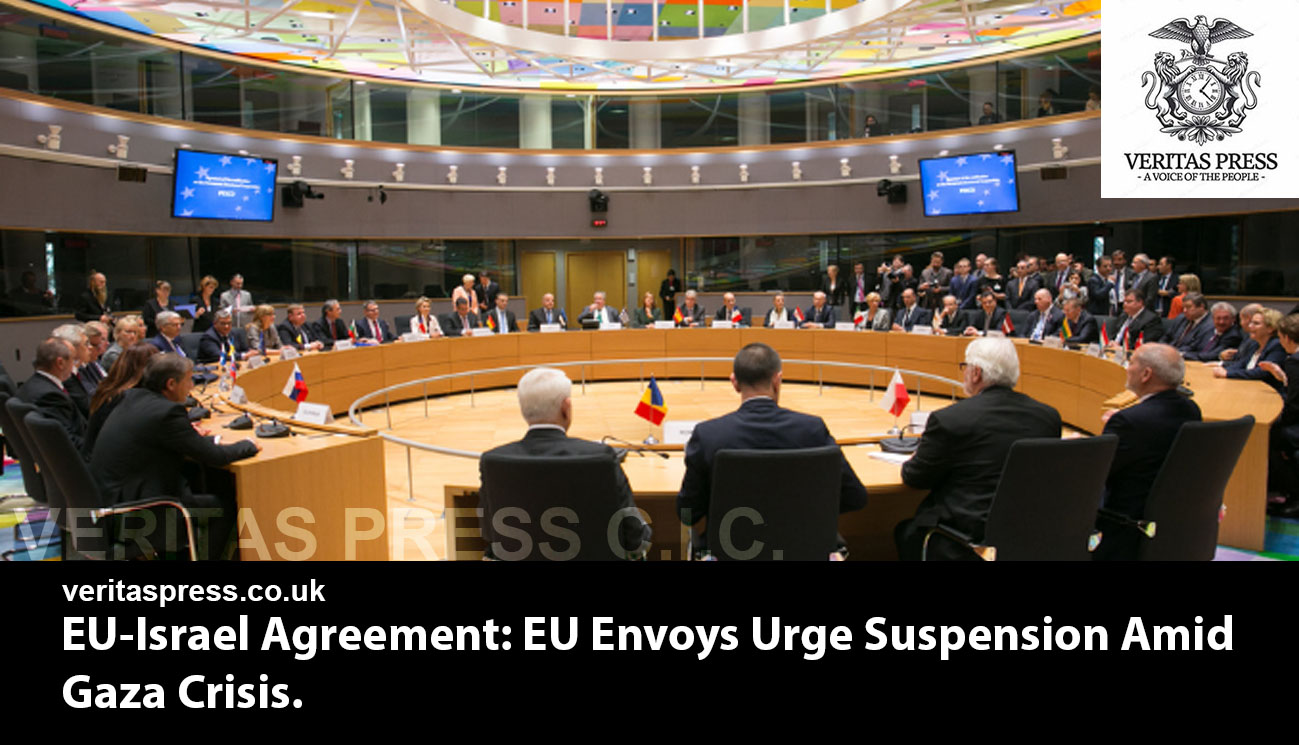Press Release: Veritas Press C.I.C.
Author: Kamran Faqir
Article Date Published: 11 Sept 2025 at 16:20 GMT
Category: Europe | European Union | EU-Israel Agreement
Source(s): Veritas Press C.I.C. | Multi News Agencies
In a rare and unprecedented move, over 300 European Union (EU) and member state ambassadors, alongside senior EU officials, have publicly called for the immediate suspension of the EU-Israel Association Agreement. Their joint letter, addressed to EU institutions and the leaders of all 27 member states, urges decisive action in response to Israel’s ongoing military offensive in Gaza and the resulting humanitarian catastrophe.
“We cannot stand idly by, watching Gaza reduced to rubble and its inhabitants to destitution and starvation,” said EU Ambassador Sven Kühn von Burgsdorff, speaking on behalf of the signatories. “The issue is whether the EU and like-minded nations are going to stand up for basic humanity and for the values that underpin the post-war international order.”
The EU-Israel Association Agreement, signed in 1995, created a deep framework for trade, research, and political cooperation. In 2024, the EU accounted for 32% of Israel’s total trade in goods, making it Israel’s largest trading partner. Total trade between the EU and Israel reached €42.6 billion, including significant cooperation in energy, environment, and research projects.
However, the humanitarian crisis in Gaza has pushed EU diplomats and officials to reassess this partnership. According to humanitarian organisations, including the UN Office for the Coordination of Humanitarian Affairs (OCHA), Gaza faces severe shortages of food, medicine, and electricity, with hospitals struggling to provide care amid continuous Israeli military strikes.
European Parliament Takes A Stand:
On Thursday, the European Parliament passed a landmark resolution calling for sanctions on members of the Israeli government and a suspension of certain payments to Israel. This marks the Parliament’s first unified stance on Gaza since the October 7, 2023, Hamas attacks on Israel, coinciding with European Commission President Ursula von der Leyen’s announcement of sanctions against “extremist ministers” and violent settlers, and partial suspension of trade provisions in the EU-Israel Association Agreement.
The Parliament resolution urges EU governments to recognise the state of Palestine as a step toward a two-state solution and condemns Israel’s obstruction of humanitarian aid to Gaza, describing it as having caused famine conditions in northern Gaza. It also calls for investigations into alleged war crimes and human rights violations, demanding accountability for all responsible.
“Man-made famine can never be a weapon of war. For the sake of the children, for the sake of humanity, this must stop,” Von der Leyen said in Strasbourg.
EU diplomats, including Kühn von Burgsdorff, emphasised that these measures are a minimum standard. They are calling for a full suspension of the Association Agreement and targeted sanctions against Israeli government officials. Signatories also urged 13 EU member states to formally recognise Palestine, aligning with 147 UN member countries that have already done so.
Von der Leyen also announced a freeze of €14 million in ongoing EU-Israel projects, including institutional cooperation programs, while continuing funding for Israeli civil society organisations and Yad Vashem, highlighting a nuanced approach balancing political accountability with cultural and humanitarian support.
Divisions Within The EU:
The EU’s response has exposed deep political divisions among member states. Germany, Hungary, Austria, and the Czech Republic have expressed strong support for Israel, citing historical ties and national security concerns. Conversely, countries like Spain, the Netherlands, and Ireland have pushed for stronger measures, criticising Israel’s military offensive and obstruction of aid.
German Chancellor Friedrich Merz has sharply condemned Israel’s airstrike on Hamas negotiators in Doha, Qatar, describing it as a violation of international law, while reaffirming Berlin’s support for Israel’s security. At the same time, he criticised Israel for withholding funds from the Palestinian Authority, which compromises essential public services in Gaza.
“The withholding of Palestinian Authority funds is unacceptable. The EU must uphold human rights and ensure humanitarian aid reaches those in need,” Merz said in Berlin.
The Parliament resolution passed with 305 votes in favour, 151 against, and 122 abstentions, reflecting compromises among centre-right, liberal, and Green parties. The European People’s Party (EPP) succeeded in removing direct references to “genocide” and “man-made famine” but still endorsed the suspension of trade elements and sanctions against extremist ministers.
International And NGO Reactions:
Internationally, the Netherlands has announced plans to ban imports from Israeli settlements in the occupied West Bank, citing Israel’s planned expansion and military actions in Gaza. Human rights organisations, including Amnesty International and Human Rights Watch, have echoed EU diplomats’ calls, warning that ongoing Israeli operations may constitute war crimes and crimes against humanity.
According to analysts at the European Council on Foreign Relations (ECFR), the EU’s leverage lies largely in trade and research cooperation, yet unanimity requirements to suspend agreements pose a substantial barrier.
“The EU has economic leverage over Israel, but internal divisions and political calculations often weaken its diplomatic response,” said Michael Doyle, former EU ambassador and co-organiser of the diplomats’ letter.
Humanitarian Imperative And Political Pressure:
The diplomats’ letter and Parliament resolution underline the urgent need to halt Israel’s military offensive and alleviate Gaza’s humanitarian crisis. Reports from OCHA and Médecins Sans Frontières indicate that tens of thousands of civilians remain displaced, with hospitals overwhelmed and famine conditions intensifying.
“If the EU truly values human rights and international law, it cannot continue business as usual with Israel while civilians in Gaza starve,” said Hilde Vautmans, Belgian MEP and negotiator of the resolution.
By pressing for suspension of the Association Agreement, recognition of Palestine, and targeted sanctions, EU diplomats are signalling a potential turning point in European foreign policy, one that could reshape the bloc’s leverage in the Israeli-Palestinian conflict.
Conclusion: A Test Of EU Credibility And Accountability.
The EU finds itself at a crossroads: to uphold human rights and international law, it must confront a long-standing partner whose actions in Gaza and the Middle East have sparked global outrage. With mounting pressure from diplomats, parliamentarians, NGOs, and the international community, the European Union faces a defining test of its commitment to humanitarian principles, trade accountability, and the pursuit of a sustainable two-state solution.
The diplomats’ unprecedented call to suspend the EU-Israel Association Agreement exposes a stark truth: decades of trade, research, and diplomatic engagement have failed to curb Israel’s systematic violations of international law in Gaza. Humanitarian organisations report that tens of thousands of civilians remain trapped under siege conditions, with hospitals overwhelmed, basic services collapsing, and famine emerging as a deliberate instrument of war.
The European Parliament’s resolution, coupled with Ursula von der Leyen’s proposals for targeted sanctions and partial suspension of trade, represents a cautious but meaningful step toward accountability. Yet EU internal divisions, between states prioritising historical and security alliances with Israel and those pressing for human rights compliance, risk diluting the bloc’s leverage and moral authority. The unanimity requirement to suspend the Association Agreement, alongside political reluctance from key players like Germany, underscores the limits of Brussels’ current framework to respond effectively.
Analysts, activists, and human rights organisations warn that partial measures risk being merely symbolic. As Michael Doyle, a senior EU diplomat, noted:
“Words without decisive action are insufficient. The EU must use its economic and diplomatic leverage, or it risks complicity in ongoing violations of international law.”
“The world is watching. History will judge the EU on whether it stood by its values or chose convenience over humanity,” warned Kühn von Burgsdorff.
The crisis in Gaza demands more than measured statements; it requires concrete, enforceable policies that prioritise human rights over geopolitical expediency. The EU’s next steps will reveal whether it can transform its trade and diplomatic influence into meaningful pressure, hold accountable those responsible for human suffering, and signal to the world that European values of law, justice, and humanity are not negotiable.
In short, the situation is a defining moment not only for the EU’s foreign policy but for its moral credibility: will Europe act decisively to protect civilians and uphold international law, or will it allow convenience and political caution to overshadow principle?




























Leave a Reply